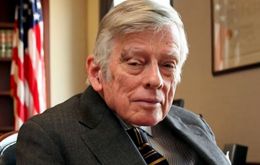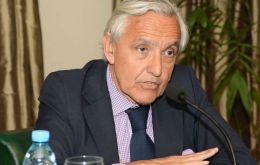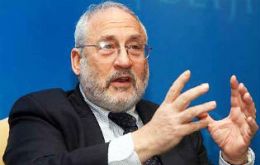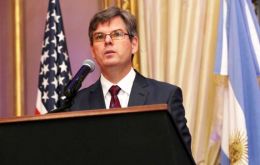MercoPress. South Atlantic News Agency
Tag: Vulture funds
-
Friday, August 8th 2014 - 08:49 UTC
The Guardian: How Barack Obama could end the Argentina debt crisis

By Greg Palast (*) - US president need only inform a federal judge that vulture fund billionaire Paul Singer is interfering with the president's sole authority to conduct foreign policy. He hasn't. But why not?
-
Friday, August 8th 2014 - 07:09 UTC
Griesa summons hearing for Friday; Argentina launches proceedings against the US in The Hague

New York District judge Thomas Griesa has scheduled a hearing at 4 pm local time on Friday to address Argentina's recent public statements over their attempts to pay creditors, a court official said. Representatives from both Argentina and holdout investors have been called to the hearing, which will take place in New York.
-
Thursday, August 7th 2014 - 07:02 UTC
Argentina closer to contempt of court as it suggests bondholders to change paymaster

New York district judge Thomas Griesa and the Argentine government are again on the collision course: while the magistrate has ordered the Bank of New York Mellon to retain the funds deposited by Argentina to pay exchange bondholders and declaring the payment “illegal”, the Ministry of Economy in Buenos Aires suggested bondholder should change BONY for a new intermediary institution.
-
Tuesday, August 5th 2014 - 06:54 UTC
Griesa praises Pollack's 'great skill” and reveals he directed the use of 'default'

U.S. District Judge Thomas Griesa on Monday turned back an effort by Argentina's government to remove the court-appointed mediator in the dispute with creditors that triggered a 'selective default' situation by the country last week. He also revealed that the default condition was at his direction and was 'accurate'.
-
Monday, August 4th 2014 - 07:34 UTC
Debt ruling shows a callous disregard to the effects on Argentina

By Eileen Appelbaum (The New York Times) - There is no way to construe as fair the United States court ruling that Argentina cannot pay 93% of its creditors, unless it first pays a small group of hedge funds. It's not fair to the 93% of bondholders who negotiated a restructuring of Argentina’s debt in 2005 and 2010 with reduced payments.
-
Monday, August 4th 2014 - 07:09 UTC
Malvinas war and the 2001 and 2014 defaults, Argentina's worst mistakes in 33 years

The Falklands/Malvinas war, the 2001 default and the 2014 default are “the three events that are going to go down, in recent Argentina history, as the three worst strategic mistakes committed by the country”, according to political analyst and historian Rosendo Fraga.
-
Sunday, August 3rd 2014 - 13:22 UTC
“Argentina Finds Relentless Foe in Paul Singer’s Hedge Fund”

The following article by Peter Eavis and Alexandra Stevenson was published in The New York Times and addresses the current litigation between Argentina and the speculative funds. The hedge fund firm of billionaire Paul E. Singer has about 300 employees, yet it has managed to force Argentina, a nation of 41 million people, into a position where it now has to contemplate a humbling surrender.
-
Saturday, August 2nd 2014 - 09:18 UTC
“Debt restructuring” and the Argentine case by Joseph Stiglitz

The following piece published in The New York Times was written by Joseph E. Stiglitz, winner of the Nobel Prize in Economics and a former chief economist of the World Bank, and currently a professor at Columbia University.
-
Saturday, August 2nd 2014 - 08:58 UTC
Argentina suggests Griesa and Pollack are actively helping holdouts by declaring a 'default'

The Argentine Economy Ministry claimed on Friday New York judge Thomas Griesa has benefited “vulture funds” during negotiations over Argentina's defaulted debt with holdouts and asked the (Argentine) National Values Commission (CNV) to start an investigation over alleged “speculative moves”.
-
Friday, August 1st 2014 - 08:33 UTC
US calls on Argentine government to seek 'practical solutions' with holdouts

Kevin Sullivan, US interim ambassador in Argentina affirmed on Thursday that the country must seek “practical solutions” with the 'holdouts' or the so called vulture funds over defaulted bonds.
